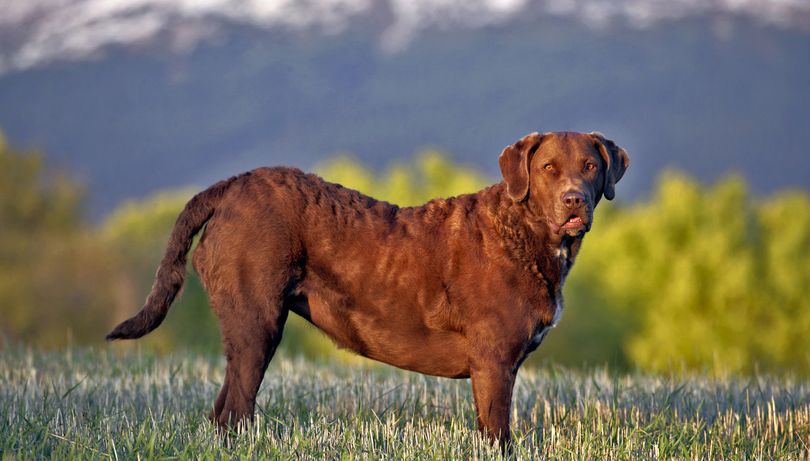Dog Breed
Chesapeake Bay Retriever

- Full Name
- Chesapeake Bay Retriever
- Your PupScore
- Take the best dog breed quiz to get your Pup Scores!
- Life Span
- 10 - 13 years years
- Weight
- 55 - 80 pounds
- Description
Affectionate, Intelligent, Quiet, Dominant, Happy, Protective
- Bred For
- Water Retriever
- Family Considerations
- Overall Ease of Breed
- Personality
- Home and Environment Considerations
- Physical Characteristics
Child Friendly
5/5
Is the Chesapeake Bay Retriever good with children?
Yes! The Chesapeake Bay Retriever is naturally friendly with children. As always, socialization is always important, but the Chesapeake Bay Retriever is an excellent dog for anyone with small children.
Stranger Friendly
4/5
Is the Chesapeake Bay Retriever friendly with strangers?
Yes, the Chesapeake Bay Retriever is very friendly with strangers. We still recommend early socialization while the Chesapeake Bay Retriever is a puppy to introduce them to various new people, but in general they are friendly with everyone.
Dog Friendly
5/5
Is the Chesapeake Bay Retriever friendly with other dogs?
Yes! The Chesapeake Bay Retriever naturally loves other dogs. As always, socialization is always important, but the Chesapeake Bay Retriever typically gets along with every dog it meets
Likes to Cuddle
5/5
Does the Chesapeake Bay Retriever like to cuddle?
The Chesapeake Bay Retriever loves physical affection and cuddles. If you're looking for a cuddle partner you may have found the one!
Playfulness
5/5
Does the Chesapeake Bay Retriever like to play?
The Chesapeake Bay Retriever is always ready for play! It's important to keep in mind, as they need to be stimulated with games and affection throughout the day.
Service Dog Ability
5/5
Does the Chesapeake Bay Retriever make a good service dog?
The Chesapeake Bay Retriever is a common service dog. The Chesapeake Bay Retriever is smart, dedicated, and patient. However, despite the Chesapeake Bay Retriever being an excellent breed for service work, they must pass through an extensive training period and only some will be up for a life dedicated to service work.
Ease for Novice
5/5
Is the Chesapeake Bay Retriever good for first-time owners?
The Chesapeake Bay Retriever is an excellent breed for first-time owners. They love pleasing their owner, and rarely are aggressive or over-dominant.
Training Potential
5/5
How well can the Chesapeake Bay Retriever be trained?
The Chesapeake Bay Retriever can be trained to the highest level and is oftentimes seen in various competitions. The Chesapeake Bay Retriever is not only intelligent, but it wants to please its owner and is motivated with competition, especially if it feels like it has a job assigned to it.
Amount of Shedding
4/5
Does the Chesapeake Bay Retriever shed a lot?
The Chesapeake Bay Retriever sheds a lot! They may still shed less than a few other breeds, but be prepared for dog hair throughout the home and on your clothes.
Ease of Grooming
3/5
Is the Chesapeake Bay Retriever easy to groom?
The Chesapeake Bay Retriever requires an average amount of grooming. Taking your Chesapeake Bay Retriever to the pet salon will make your life easier, but its possible to groom a Chesapeake Bay Retriever on your own as well.
Exercise Need
4/5
Does the Chesapeake Bay Retriever need a lot of exercise?
The Chesapeake Bay Retriever has a lot of energy and getting daily exercise is very important, both for their well-being and for their focus, which is important when you train them.
Intelligence
4/5
How smart is the Chesapeake Bay Retriever?
The Chesapeake Bay Retriever is very smart. Above-average intelligence means they can pick up on cues and signals quickly when it comes to training. But it also means that they need to be challenged mentally, in addition to their standard exercise needs.
Amount of Barking
4/5
How much does the Chesapeake Bay Retriever bark? Does the Chesapeake Bay Retriever bark too much?
The Chesapeake Bay Retriever barks a lot. This is important to consider with your living situation- will it be ok when you leave them at home alone or will they disrupt the neighbors? The Chesapeake Bay Retriever will oftentimes bark just to express their thoughts... even just to be heard!
Guard Dog Ability
4/5
Is the Chesapeake Bay Retriever a good guard dog?
The Chesapeake Bay Retriever is not a dog breed necessarily known as a guard dog, but they are alert. The Chesapeake Bay Retriever is protective of its family, and has above average tendencies when it comes to guarding property.
Tolerates Being Alone
2/5
Is the Chesapeake Bay Retriever good at staying alone? Is the Chesapeake Bay Retriever independent?
The Chesapeake Bay Retriever is not very independent and does not do great when left behind for longer than a couple of hours. This is one of the most important things to consider when getting a new dog.
Good for Apartment Living
2/5
Is the Chesapeake Bay Retriever a good apartment dog?
The Chesapeake Bay Retriever is not a good dog for apartment living for several reasons. It is still possible to make it work if the owner is dedicated to plenty of training and daily exercise, but it may be challenging.
Size
3/5
How big is the Chesapeake Bay Retriever?
The Chesapeake Bay Retriever is a medium sized dog breed. They can range in size depending on genetics, and males are larger on average than females.
Tolerates Heat
3/5
How much does the Chesapeake Bay Retriever tolerate hot weather? When is it too hot for a Chesapeake Bay Retriever?
The Chesapeake Bay Retriever can tolerate some heat, but should not be over-exposed to hot weather. In general, they can live in hot weather climates, but would do best with air conditioning or at least a fan in their home, especially where they sleep.
Tolerates Cold
3/5
How much does the Chesapeake Bay Retriever tolerate cold weather? When is it too cold for a Chesapeake Bay Retriever?
The Chesapeake Bay Retriever can tolerate some cold, but should not be over-exposed to cold weather. In general, they can live in cold weather climates, but may need clothing on particularly cold evenings or in snow.
Potential to Run Away
4/5
Does the Chesapeake Bay Retriever try to run away?
It is natural for the Chesapeake Bay Retriever to run away. They are easily distracted and excited, so the urge to run away should be expected and prepared for- a fenced yard is important.
General Health
2/5
Is the Chesapeake Bay Retriever a healthy dog? The health of a Chesapeake Bay Retriever should be measured not just by how many years they live, but also by how many health issues they've had. It is important to know which health conditions your breed is prone to- hip problems, eye problems, bloating, and arthritis are all common dog health problems.
The Chesapeake Bay Retriever has many health problems that should be considered. The Chesapeake Bay Retriever can still live a perfectly healthy life, but it's important to consider all of these health risks ahead of time.
Energy Level
4/5
How energetic is the Chesapeake Bay Retriever?
The Chesapeake Bay Retriever has a lot of energy and this needs to be considered before bringing the Chesapeake Bay Retriever into your home. Can you give your Chesapeake Bay Retriever enough exercise? They will need several small daily walks, or a large dog park trip to get all of the energy out.
Amount of Drooling
3/5
How much does the Chesapeake Bay Retriever drool?
The Chesapeake Bay Retriever drools an average amount- typically only after heavy exercise or if you are eating their favorite human food in front of them.
Prey Drive
3/5
Does the Chesapeake Bay Retriever have a large prey drive? Does the Chesapeake Bay Retriever like to chase birds, cats, and other small animals?
The Chesapeake Bay Retriever has average prey drive. They will probably enjoy chasing after birds and other small animals at the park, and it may be an issue at the home if you have small animals, but with some training and introduction can usually learn to live with them.
Athleticism
4/5
Is the Chesapeake Bay Retriever atheltic?
The Chesapeake Bay Retriever is very athletic and would be well suited for a family that frequently works out or goes on adventures.
 Dog
Dog- Sporting
- Retriever
- Chesapeake Bay Retriever
The Chesapeake Bay Retriever is a purebred dog that belongs to the Retriever sub group, which falls under the larger Sporting dog breed group.
Sporting group: Sporting dogs are the natural athletes of the dog world. They have high energy, and always look to be stimulated with some activity or challenge.
These dogs thrive in the outdoors- particularly the woods and the water. Sporting dogs include the best swimming dogs, retrieving dogs, and other field activities. They have traditionally been bred to assist hunters find and retrieve birds and other smaller hunting game.
Sporting dogs are not known as guard dogs, but because of their alertness and loyalty to their family, with proper training they can be good home protectors as well.
Over the years they have become extremely well-rounded, so with plenty of exercise can make excellent home companions. They are willing to please their owners, so if you put the time into training and exercise you will be rewarded with an amazing dog.
Retriever sub-group: Retrievers are one of the most globally recognized and loved breeds. They were bred to retrieve (especially birds) for their hunters. This has translated to a natural eagerness to please their owners. Combine that with their friendliness and intelligence and they make an amazing family dog. They can be trained well, and do not necessarily need an alpha type of owner.
Because of the retriever's incredible versatility, they excel in a variety of other activities such as drug detection, service dogs for the blind, search and rescue dogs, and more. An owner should take advantage of the dog's eagerness to please by giving them challenges, and letting them feel rewarded for their good actions. The 'retrieving' is so bred into the nature of the dog that typically you do not need to teach them to "fetch" ... they just do.
Retrievers aren't perfect though- they have been known to have a variety of health problems, most common being hip problems. Make sure you go through a reputable breeder, and don't be shy to ask about the hips of their dogs.
Chesapeake Bay Retrievers for adoption
Similar Breeds

